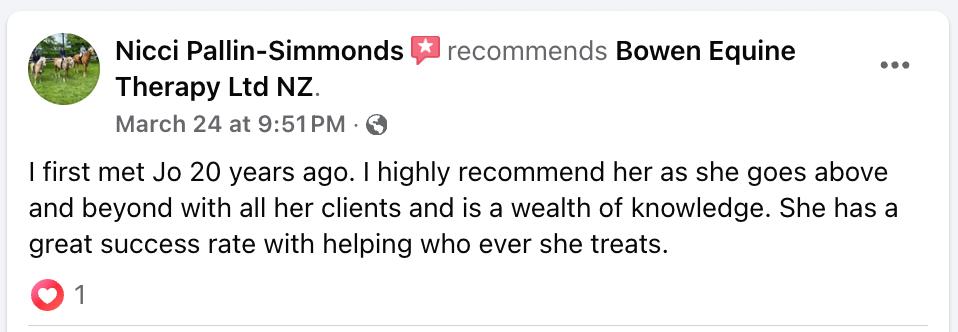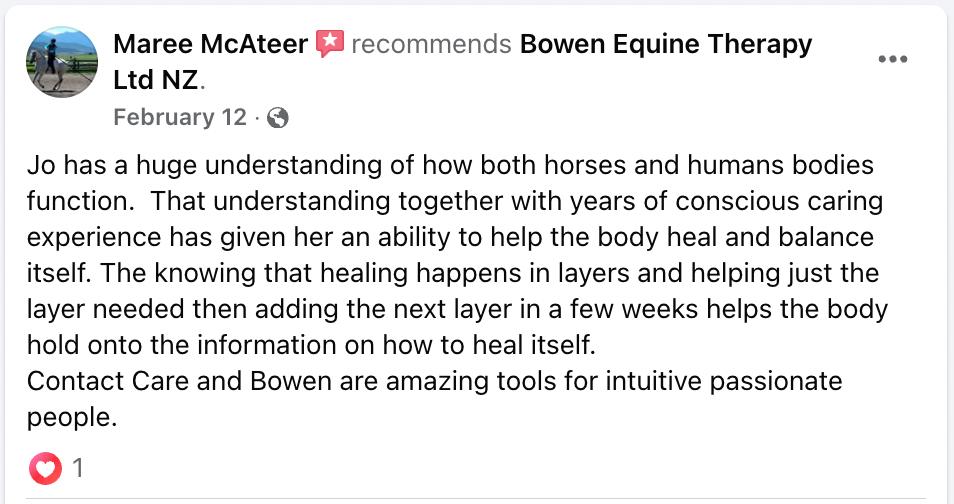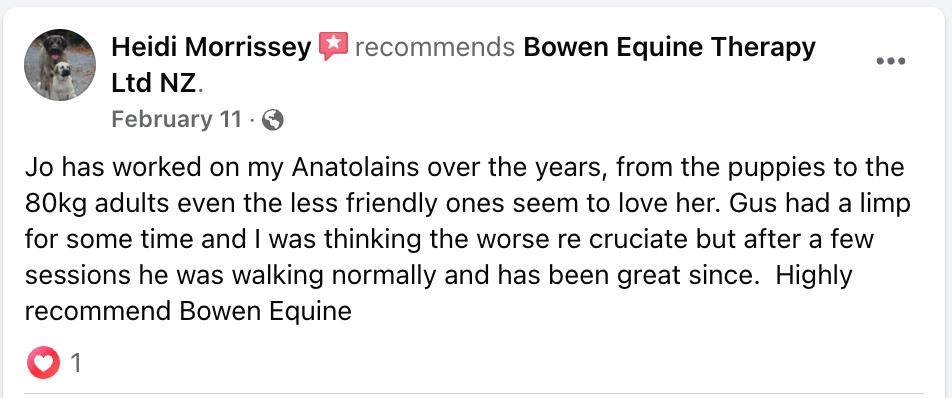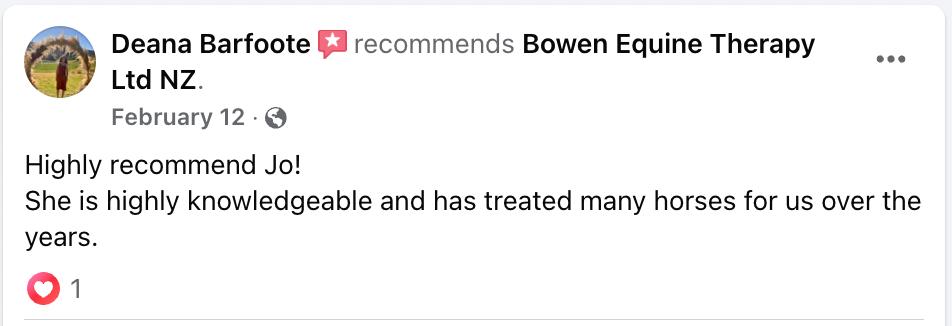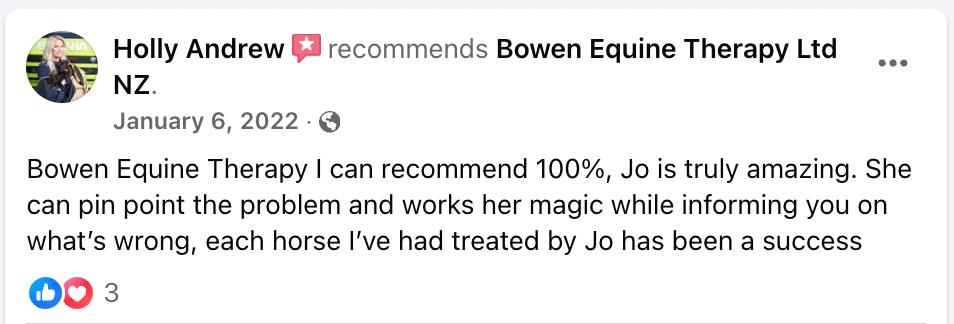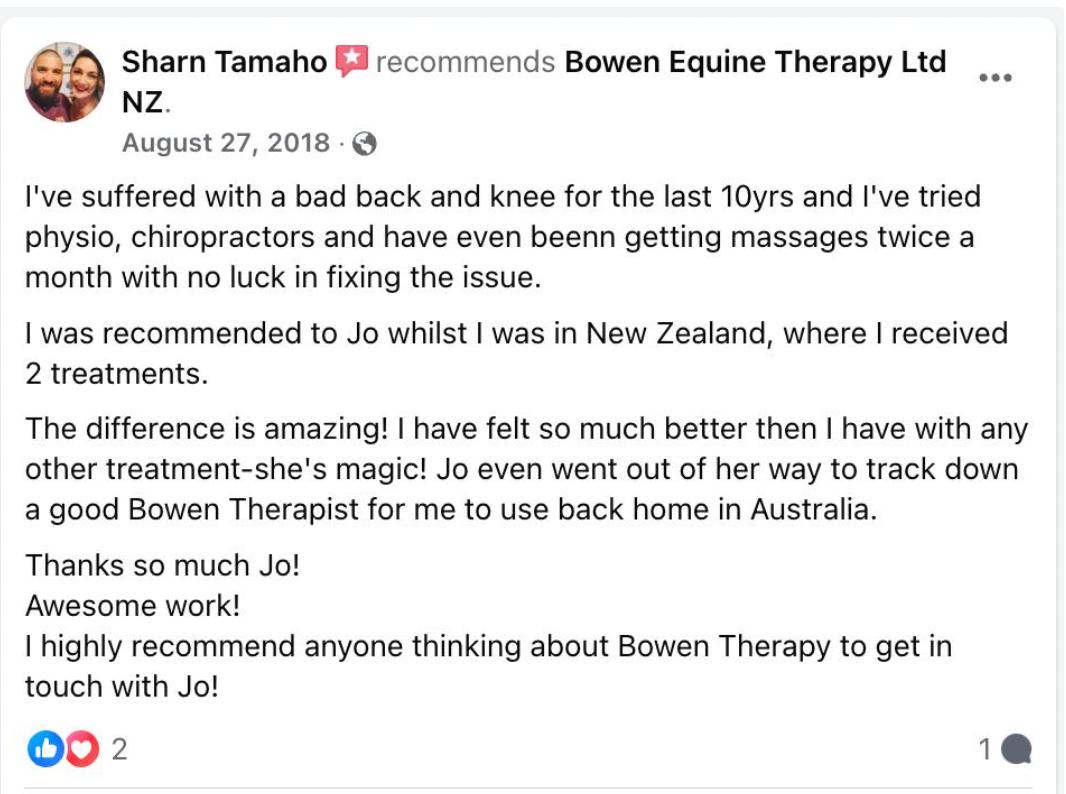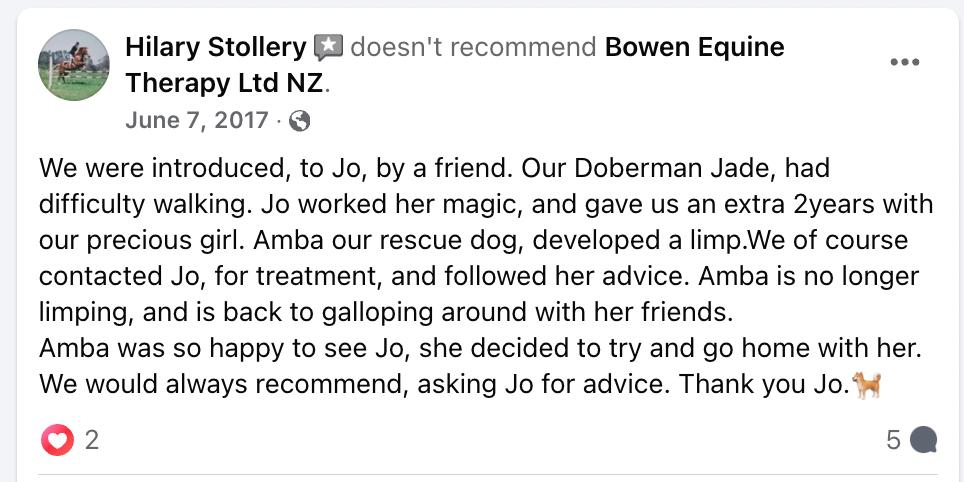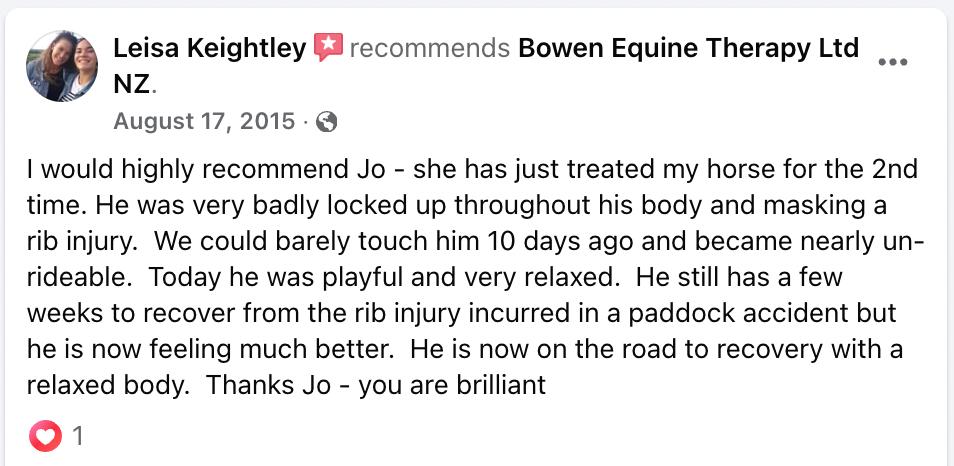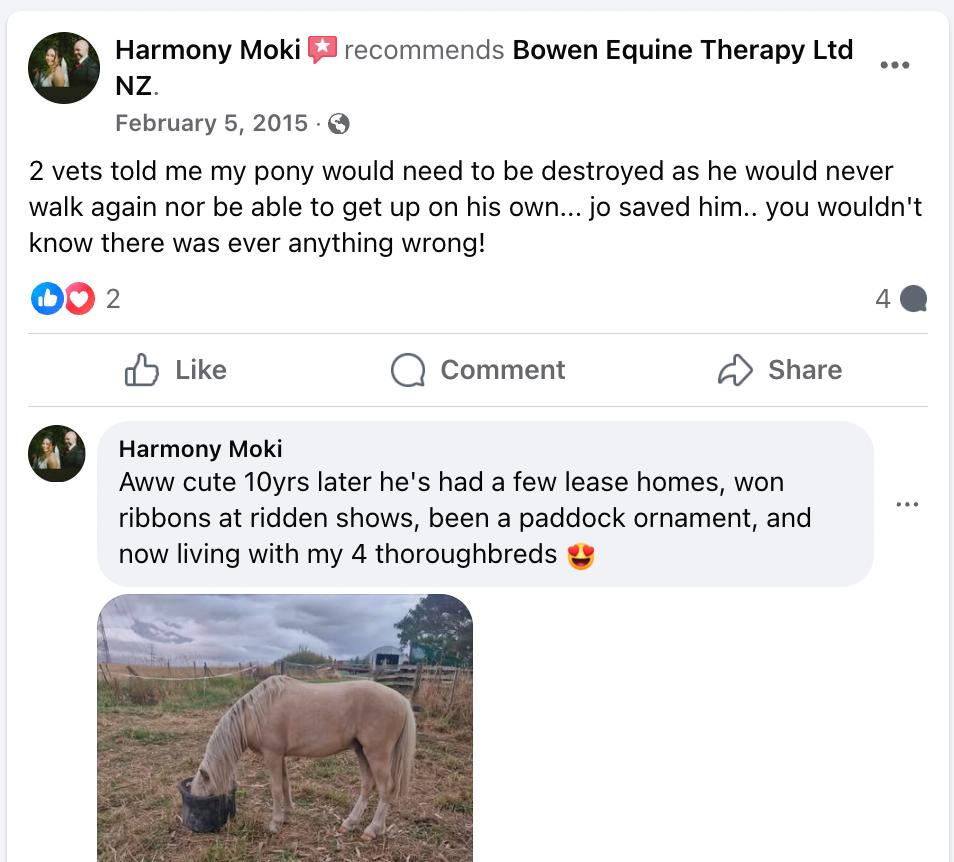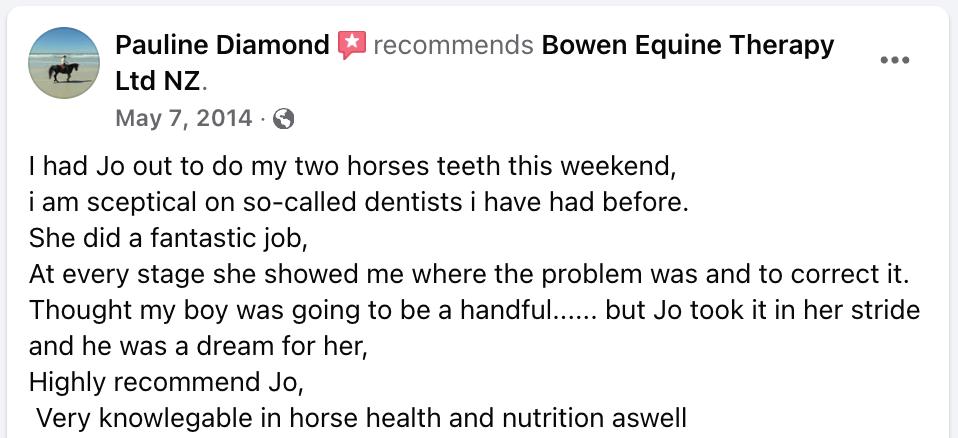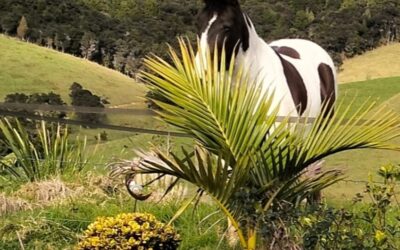Bowen Therapy for Horses
Restore mobility and relieve pain with Animal Bowen Therapy!
Gentle muscle release technique to improve well-being in horses
Animal Bowen Therapy enables the body to heal and repair itself at all levels.
Bowen Therapy can provide the manual adjustment required to bring your horse back to peak performance and well being.

Horse Bowen Therapy available in Northland and Auckland
Bowen treatment (Equine) incl saddle & dental check $70.00
Bowen treatment (Equine) follow up $60.00
Equine Dental Basic Float $120.00
*Overall prices may vary depending on the work required on the individual patient, for examples extra for travel, extractions, charts etc..
**Please note these are Northland prices only. Jo does offer clinics in Auckland on an appointment only basis. Please contact Jo for more information.
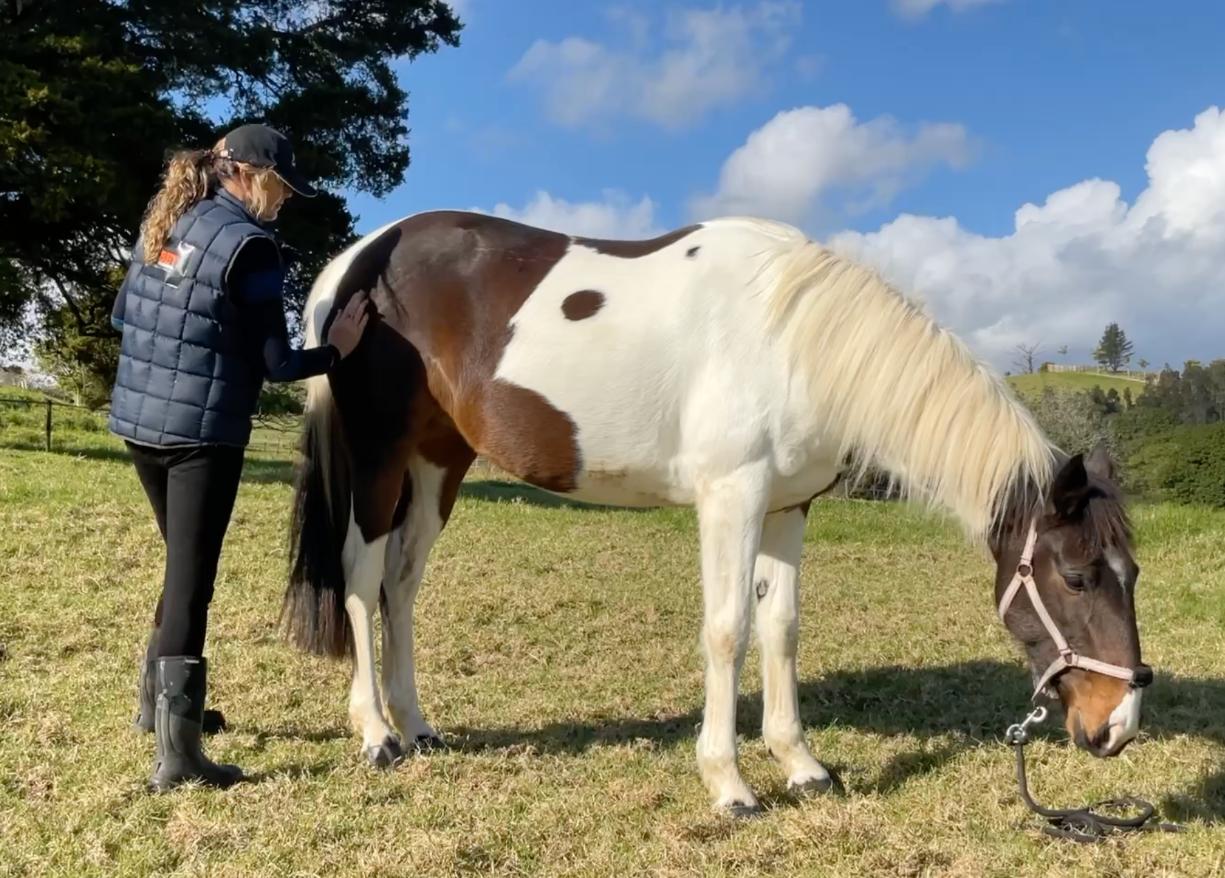
A few examples of happy clients…
What is Bowen Therapy?
Bowen Therapy is a non invasive soft tissue therapy.
Similar to Chinese acupressure, using a gentle cross fibre move across muscles, tendons & ligaments. It activates the body’s own powerful natural healing process allowing it to reset & rebalance itself. This in turn produces rapid & long lasting relief from pain & discomfort.
Why Bowen therapy?
Because everything in the body is connected. What we often see as a problem may actually be just a symptom — a sign that the body is compensating or offloading stress elsewhere.
Bowen Therapy offers a gentle, holistic approach to healthcare for horses. Think of it like a regular service for your vehicle. Each treatment helps to rebalance the entire body, leaving your animal more relaxed, supple, and energised.
BENEFITS OF HORSE BOWEN THERAPY
Eliminates your animals pain and discomfort
Increases mobility and range of motion
Improves circulation, by increasing necessary blood flow
Improves energy levels and performance
Helps prevent injury allowing better flexibility of the muscles
Assists the body to repair muscle fibres that have been injured and damaged by restoring homeostasis (balance)
Improves the overall mood (behavioural issues), the coat and appetite of your animal!
Bowen Therapy helps
Bowen for animals has helped the following conditions:
- Spinal issues – bulging or slipped discs
- Sacroiliac pain
- Shoulder lameness
- Neck & Jaw pain
- Laminitis
- Lymphatic drainage issues
- Growing pains especially in larger animals
- Scrambling in floats
- Nerve pain
- Restricted movement
- Intermittent lameness
- Locking or sore stifles
- Skeletal misalignment
- Sore backs, cold backs, roached backs especially when touched
- Leg swelling (Oedema)
- Muscle, ligament, tendon strains
- Muscle wastage
- Respiratory disorders
- Removal of metabolic waste & tying up issues
- Muscle tightness
- Back pain from I’ll fitting saddles or imbalanced riders
- Seizures
- Ataxia
- Bladder leakage
- Unexplained deterioration in performance
- Toe dragging & uneven dragging of feet
- Disunited paces
- Unwilling to go on one rein or stiffness on one rein
- Wound healing-speeds recovery through improved circulation
- Uneven muscle development
- Pre & post birthing assistance
- Degenerative disorders
- Unexplained irritability
- Emotional problems caused by fear from tightness/soreness issues
- Prevention of body problems as from an athletes point of view or as a feel good treat for your dog, horse or companion animal
How Bowen Therapy Works
Bowen Therapy works with the fascia — the connective tissue that wraps around every muscle, bone, organ, and nerve in the body. Using a series of gentle, cross-fibre moves in a specific sequence, the fascia is encouraged to release its tension. This allows tight or ‘glued’ areas to soften and rehydrate, which is why you may feel extra thirsty or need to urinate afterward — it’s all part of the healing process.
When an area of the body is out of balance, the fascia can become sticky or restricted. The body often compensates by offloading stress elsewhere. Within 24 hours (for acute issues) or up to a week for more chronic conditions, the areas treated begin activating the body’s natural healing response, helping it to unwind and release tension.
Trauma, especially when muscles are in spasm, can confuse the body — neural pathways get disrupted, and natural movement patterns are forgotten. It’s not uncommon for old pains or sensations to resurface midweek. This is simply part of the realignment process. Even though the treatment is subtle, the after-effects can be powerful. As the body unravels, those old aches are signs that deeper healing is occurring.
Since fascia surrounds every system in the body, Bowen Therapy reaches deep. The second session is often the most noticeable — typically taking only 24 hours to create visible shifts. A third treatment tends to be even more profound, with the body responding faster and the client feeling more vibrant and free in their movement.
Treatment
Treatment Timing
Bowen sessions are generally spaced 7–10 days apart.
This gives the body time to process and integrate the changes — what we call “cooking time.” These intervals also help us track how pain shifts in the body and identify where the original issue began.
A Blended Approach
While Bowen Therapy is the foundation of our work, we also integrate other modalities such as Ortho-Bionomy (also known as Contact Care), Craniosacral work, and other subtle techniques to support your animal’s recovery.
In some cases, we may use therapeutic tools like:
-
Bioptron light therapy
-
Zapper machine
-
Magnetic blankets
-
Herbal, homeopathic, and tissue salt remedies
For topical support, we use natural products like Fixt Cream or the pet-friendly Rapid Ease, along with other herbal blends.
Explore more useful information about Horses
Worming your horse naturally
A practical recipe for natural horse worming: herbs, seeds, charcoal, and routines to support parasite control in resistant, gut-sensitive horses.

